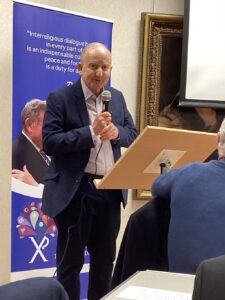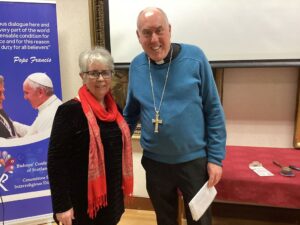A report on our Conference marking International Human Fraternity Day, by Joseph Sikora
In February we marked International Human Fraternity Day, celebrating the signing of the Document on Human Fraternity for World Peace and Living Together by Pope Francis and the Grand Imam from Al-Azhar University, Ahmed el-Tayeb in 2019. The document led to the setting up of the Higher Committee on Human Fraternity, composed of Christians, Muslims and Jews and was instituted to promote human fraternity values in communities around the world.
Held in the Archdiocesan Offices in Glasgow, the event was hosted by Bishop Brian McGee, who heads the Committee for Interreligious Dialogue and facilitated by Brett Nichols. Brett is a Christian and is interested in all religions and how they influence the way we think, live and care for each other. He has worked with the Craighead Institute as well as serving on its Board.
This year we invited three members of the planning group, Duncan Maclaren, Ahmed Khweir and Sr. Isabel Smyth, to say three things that stood out for them in the document.

Duncan MacLaren began by noting that the Document tells me about how we should see one another- Christian and Muslim. “Faith leads a believer to see in the other a brother or sister to be supported and loved”. A move away from self-centredness to other-centredness, then act to improve the lot of the Other – orthopraxis (correct acting) over orthodoxy (correct thinking). In practical terms he argues this means “we in the Christian community must call out the casual racism that so many people of this peely-wally colour seem to think it’s their privilege to indulge in.” He concluded his observations by highlighting that, “we must take seriously in our lives the option for the poor and marginalised, reacting against those who believe desperate people fleeing persecution or poverty in boats should be sent to Rwanda or pushed back to sea. And we must show pride, not just tolerance, in having ‘New Scots’ in this country which we share and who enrich us all in so many ways.”

Ahmed Khweir reminded us all that, “dialogue isn’t just about exchanging pleasantries, it is actually about getting to know someone and seeing something from their perspective and actually understanding it from their perspective.” A culture of dialogue he pointed out “is seeing your brother and sister striving for peace and wanting to be part of it. Is seeing your brother and sister striving for justice and wanting to be part of it. Is seeing your brother and sister seek the beauty of God’s creation and wanting to share and reflect it.” In conclusion he said: The human being is created from the unity of God and our challenge is to show unity in God both spiritually and rationally.”
Sr. Isabel stressed that the document encourages the adoption of a culture of dialogue while avoiding unproductive discussions. She said: “I do believe that interfaith dialogue is a worthwhile activity in itself. But I sometimes wonder if those of us who are engaged in interfaith issues sometimes find ourselves in dialogue about matters in which we have no expertise just because we are interfaith activists.

“What we want is that social action, justice and peace groups develop an interfaith approach to their work, working alongside others interested in the same things from different faiths and none. This is what Jonathan Sacks called ‘side by side’ engagement and the focus is on the issue.”
She concluded by asking the audience, “Do we have a special and unique contribution to make, not just to mutual understanding and respect but also to social issues?”
This was followed by three open questions:
The challenges in society that particularly concern me as a person of faith are…
The challenges facing interfaith relations are…
As a person of faith and someone interested in inter-religious dialogue, the ways in which we can foster fraternity and help us live well together are…
This led to lively discussion and there was much to ponder and consider. It was important to reflect a little on the nature of interfaith relations and the place of interreligious dialogue within that. The two are not the same thing.
The feedback from the groups of course showed a great variety of responses, including the importance of working together on issues such as climate change but also the need to understand and value the religion and cultural heritage of others and the ability to dialogue with each other with humility and a willingness to learn from another’s religion in a way that will enrich our own faith tradition and take us out of our comfort zone. There was still a call for education about other faiths – “we lack understanding of the other, we need more dialogue. This will add to respect for each other and overcome being prejudiced about other religions”.
The Human Fraternity document, which was signed in the name of God and suffering humanity, covers a broad sweep of social issues which is something that we have come to expect from Pope Francis. It is truly aspirational and envisions a world free of poverty, violence, injustice, and inequality, and recognises the importance of faiths working together to establish this.

